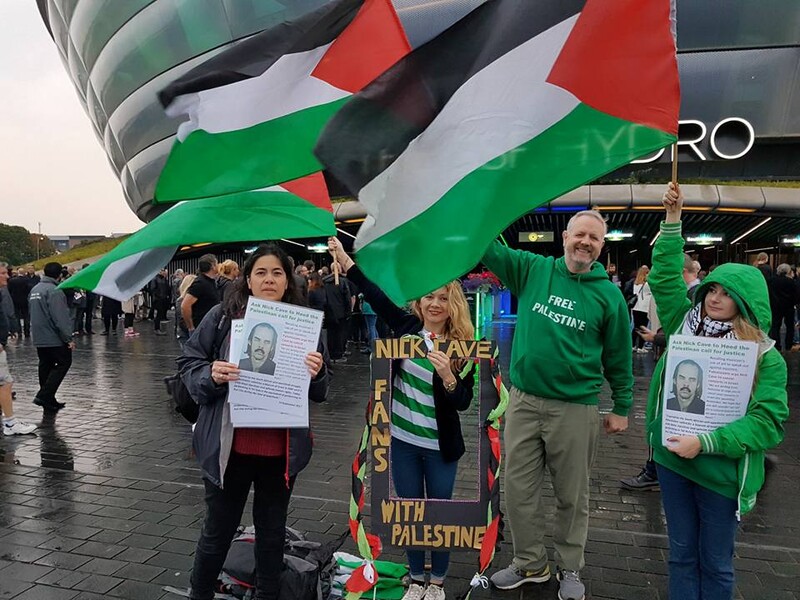Activism and BDS Beat 20 December 2017

Activists in Scotland have scored an important victory for freedom of assembly. (Scottish Palestine Solidarity Campaign/Facebook)
Efforts by Scottish police to quash Palestine solidarity protests risked breaching activists’ human rights, the country’s police watchdog has ruled.
The Police Investigations and Review Commissioner (PIRC), which oversees police conduct in Scotland, upheld three complaints by the Scottish Palestine Solidarity Campaign in November.
One concerned a police sergeant and inspector visiting a Palestine solidarity campaigner at his home in Aberdeen during the night. The campaigner was warned that he should not take part in a supermarket demonstration planned for the following day.
The PIRC ruled that police “cannot impose conditions on the location of a peaceful protest” and to do so “effectively negates the purpose of the protest.”
It reminded Police Scotland of its obligations under the European Convention on Human Rights “not to prevent, hinder or restrict peaceful assembly.”
In another incident, a police sergeant arrived at an activist workshop uninvited following a complaint about the meeting, which had been advertised on social media and was held at an Aberdeen cinema in April 2016.
Although the police claimed his attendance was to offer “advice and assistance”, the sergeant’s visit in fact appeared to be about intelligence collection. He gathered information about the group, which was then recorded on a police database. The details reported included personal information on one activist.
Intelligence collection
The PIRC said that respect for private life and freedom of assembly were put at risk by such activities, since there was no threat to public safety or likelihood that a crime would be committed.
In a third case, police officers prevented more than 30 Palestine solidarity activists from entering a court to watch a trial while allowing supporters of Israel inside the courtroom.
The police claimed its actions were to “prevent unnecessary disruption or potential public order issues with an overarching focus on public safety.” Yet the PIRC noted that the grounds for these professed concerns were unclear and “not adequately reasoned.”
Police Scotland has been ordered to reconsider whether its actions were lawful.
Damningly, the watchdog also found that officers investigating the original complaints had misrepresented the actions of the police during the incidents. It ordered two of the three cases to be investigated again by different personnel.
Sofiah MacLeod of the Scottish Palestine Solidarity Campaign told The Electronic Intifada: “We are pleased that the pattern of police intimidation has been challenged as has the fact that there was an attempt to cover this up, in effect. It is a victory for the democratic right to protest free of police interference against Israel, a rogue state which violates international law and human rights daily.”
Intimidation
The ruling is not only a blow against political policing of Palestine protests but also a significant victory for the right to protest in the UK more generally.
Alan Speirs, the head of professional standards at Police Scotland, told the press that the force would respond to the PIRC in due course.
Yet just two weeks after being rapped by the watchdog, Police Scotland again interfered with Palestine solidarity activism.
Earlier this month, images collected by the Network of Photographers for Palestine were exhibited outside St John’s Episcopal Church in Edinburgh. The display elicited a complaint of “anti-Semitism,” believed to have come from a supporter of Israel.
Police ordered that two of the 11 pictures on display be removed, leading to claims of “censorship” and “ignoring freedom of expression.”
However, this time - following a complaint - Richard Thomas, a superintendent with Police Scotland’s Edinburgh division issued a swift apology. The police said that “corrective advice and guidance” would be issued to officers.
Clearly, these recent developments are a setback for the Israel lobby’s strategy in Scotland of seeking to invoke state power to repress Palestine solidarity activism.






Comments
saor Phalaistín
Permalink Oni Hayes replied on
beir bua ✊
Good for the Scots!
Permalink Barry Wright replied on
I am sick and tired of pro-Israel pressure against citizens protesting Israel's reprehensible behavior, for example the ongoing theft of Palestinian land over many years. Israel practices apartheid, murder and theft, and is again and again denounced by the entire world, except in the USA, whose citizens often remain blissfully unaware of Israel's actions and continue to fund Israel with billions of tax dollars each and every year.